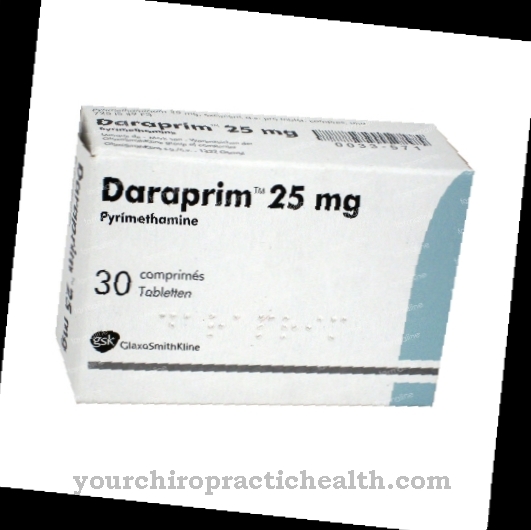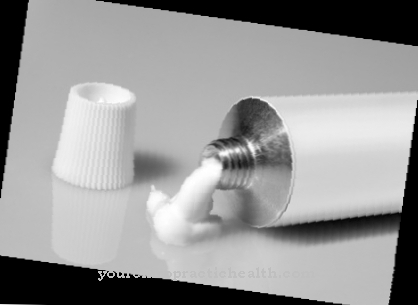At Desipramine it is a tricyclic antidepressant. It is used in the therapy of depression. However, the drug is currently no longer available in many countries and can no longer be prescribed.
What is desipramine?

Desipramine is a medicine that is usually given orally and in the form of tablets. The active ingredients have a bioavailability of almost 92 percent. The subsequent metabolism of desipramine is primarily hepatic. The plasma half-life is on average around 22 hours. The active substances contained are then excreted by the kidneys or eliminated through the kidneys.
The drug desipramine is used to treat depressive illnesses. Initially, the drug increases the patient's drive and later has a mood-enhancing effect. The active ingredient came onto the market in Germany in 1965 under the name Pertofran®. At the present time, however, finished medicinal products with desipramine content are out of distribution in the greater part of the world.
Pharmacological effect
The drug desipramine is one of the so-called tricyclic and tetracyclic antidepressants. In this group it is assigned to the tricyclic antidepressants. It primarily causes the brain to absorb the messenger substance norepinephrine. In doing so, it increases the patient's drive and improves mood. For this reason, a relatively successful therapy for depression with desipramine is possible.
In the central nervous system, desipramine reduces the reuptake of monoamines into the presynaptic vesicles. This increases the concentrations of noradrenaline and serotonin in the synaptic gap. As a result, the drug shows its antidepressant and mood-enhancing effects.
At the same time, however, tricyclics also affect the cholinergic, histaminergic and adrenergic systems. This results in a large number of side effects.
In principle, desipramine is the active metabolite of the substance imipramine. Its effects unfold in the central nervous system, where it interferes with the uptake of certain neurotransmitters. This increases their concentration, which in turn reduces depressive symptoms.
Desipramine also has a sedating effect, but this is only weak. In addition, desipramine is able to reduce the perception of pain. Basically, the absorption of desipramine from the intestine is relatively good. Due to its high first-pass effect, however, the bioavailability is reduced and can fluctuate enormously. The active substance's plasma half-life is between 15 and 25 hours.
Desipramine crosses the blood-brain barrier and the placental barrier. The active ingredient also passes into breast milk. After biotransformation, it is excreted through the kidneys and liver.
Medical application & use
The main indication of the drug desipramine is depressive illnesses. The active ingredient is usually administered in tablet form, whereby the patient has to adhere to the dosage and the timing of the attending physician. Regular check-ups during therapy ensure that the dose is continuously adjusted to the patient's condition.
The antidepressant desipramine must not be prescribed for hypersensitivity reactions to the active ingredient. If a patient has suffered from intoxication with psychotropic drugs or sedatives in the past, desipramine should also not be given. Disturbances in emptying the bladder, disturbances in cardiac conduction, glaucoma, ileus and pyloric stenosis are also contraindications.
In addition, desipramine should not be taken at the same time as MAOIs. In principle, desipramine must not be prescribed during pregnancy or while breastfeeding. In such cases, possible alternatives to the drug should be considered.
When treating with desipramine, it should be noted that there are interactions with certain other substances. For example, the effects of desipramine and alcohol can reinforce each other. Other drugs, such as pain relievers, antipsychotics, barbiturates, and antihistamines, can also produce such an effect.
Desipramine also interacts with substances that dock on the same receptors in the brain. These include, for example, serotonin reuptake inhibitors, anticholinergics or alpha sympathomimetics. Under certain circumstances, they can impair the metabolism of desipramine.
You can find your medication here
➔ Medicines against depressive moods & to lighten the moodRisks & side effects
The antidepressant desipramine can trigger a variety of side effects, which is why the therapy must be monitored by the attending physician. The most common side effects of ingestion include dry mouth, dizziness, drowsiness, blurred vision, sweating, tremors, rapid heartbeat and drop in blood pressure. In addition, the liver values can increase and weight gain, constipation and circulatory disorders can occur.
Occasionally there are urination problems and insomnia. Patients complain of anxiety, sexual problems, rashes, and feeling thirsty. The rare side effects of desipramine include circulatory collapse, confusion, urinary retention, intestinal obstruction, and changes in blood count. Functional disorders of the liver, allergic reactions in the form of vascular inflammation and skin inflammation can occur, as can cardiac arrhythmias.
During therapy with desipramine, there are occasional seizures, pneumonia, nerve diseases and movement disorders. In addition, acute attacks of glaucoma and Löffler syndrome up to delirium are possible.
Basically, headaches and drowsiness sometimes occur while taking desipramine. Sometimes the risk of suicide increases, while withdrawal symptoms can occur after discontinuing desipramine. Any side effects that occur must be reported to the attending physician immediately.
























.jpg)



